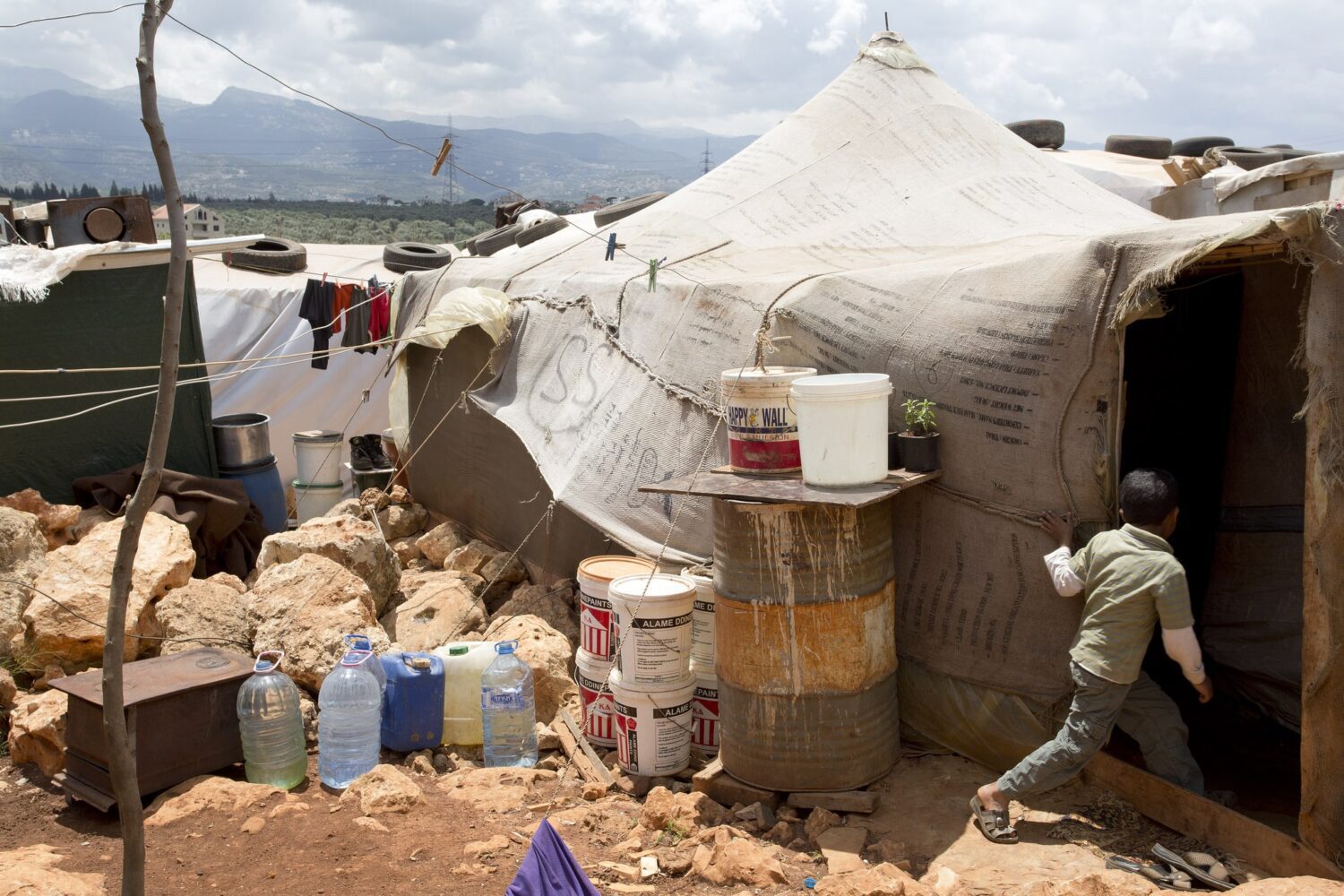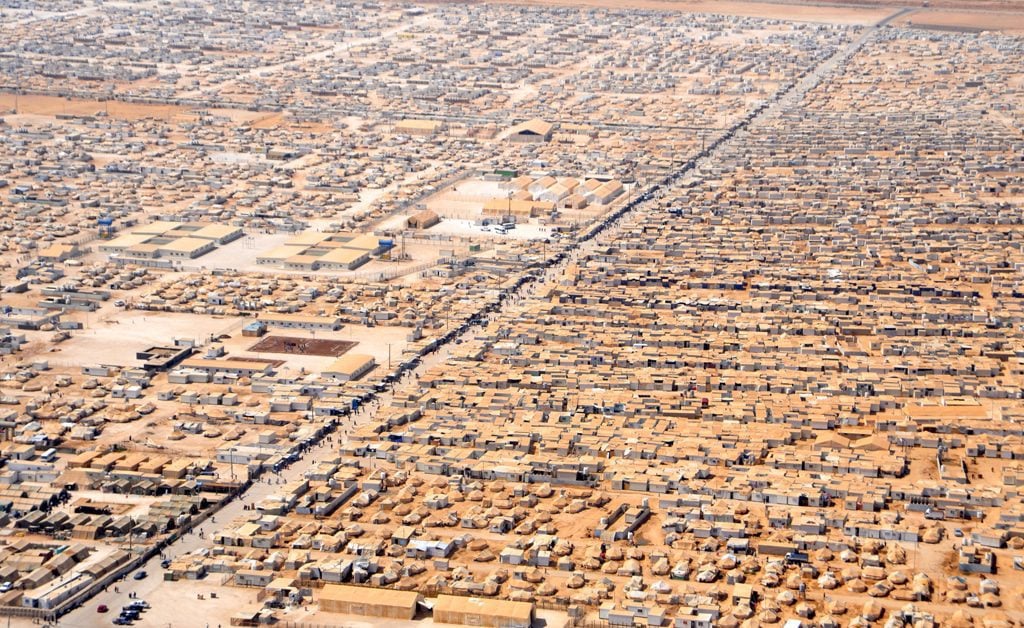
Lebanon has closed its borders to refugees fleeing Syria’s civil war, overwhelmed by an influx of more than 1.5 million people displaced since the beginning of the crisis in March 2011.
Officially, the country has accepted no displaced Syrians since October 2014, but exceptions are available for “humanitarian reasons.” Some refugees pay bribes at the official crossings, and others enter through the porous border.
Restrictions were imposed on Lebanon’s northern border in August and were extended in September to Masnaa, the main official border crossing on its eastern frontier.
Until then, Lebanon had a policy of never closing its borders to Syrian families seeking refuge, but, as the uprising enters its fourth year, the country can no longer cope on its own.
Lebanon is already hosting more than 1.1 million Syrian refugees, according to the UNHCR, while unofficial estimates put the figure at about 1.8 million, an enormous stress on a country with a population of just 4 million.
The influx has tested the country’s overstretched infrastructure and created political and security tensions. In August, Syrian militant groups, among them the extremist Islamic State (IS) and al-Nusra groups, crossed into the eastern Lebanese border town of Arsal, sparking clashes with the military that left dozens dead. The retreating militants took with them some 30 Lebanese police and troops as hostages and have since executed four. This continuing crisis is causing further strains between parts of the Lebanese population and Syrian refugees, who are being accused of supporting the Islamic State and al-Nusra.
The UNHCR has regularly urged the international community to provide Lebanon with greater assistance to tackle the influx of refugees. The agency has also called on other countries to open their doors to fleeing Syrians to ease the burden on Lebanon and other neighbouring states.
More than 3 million Syrians have fled their country since March 2011, most of them taking refuge in Lebanon, Jordan, Turkey and Iraq.
Lebanon, one of the smallest countries in the region, has shouldered the heaviest burden of the humanitarian crisis. The number of Syrian refugees living in Lebanon is equal to about 30% of the local population.
Output losses total $17.1 billion
This disproportionate number of refugees has substantially increased the pressure on the limited local infrastructure and capacities and on the economy as a whole. The Lebanese economy is expected to grow by 1.5% in 2014, compared to growth rates of 0.9% in 2013 and 1.6% in 2012, according to the Institute of International Finance (IIF). By comparison, Lebanon’s growth rates averaged about 8% from 2007 to 2010, just before the Syrian crisis began.
Today, the economic outlook remains subject to large uncertainties, as long as the fighting in Syria and the regional political turmoil continue. The IIF projected the economy’s aggregate output losses at $17.1 billion between 2011 and 2014, which is equivalent to 8.9% of the country’s cumulative GDP during that period.
The pressure is felt also on a fiscal level. The deficit is expected to reach an historical high of $5 billion by the end of 2014, compared with a deficit of $2.2 billion in 2011. This is the result of the additional costs incurred by the state in accommodating the Syrian refugees.
In the education sector, for instance, there are about 100,000 Syrian students registered, compared with 350,000 Lebanese students. The health-care system is also saturated, generating additional costs. Lebanon’s hospitals, particularly their emergency-room units, no longer have the capacity to treat the growing number of patients, and polio and syphilis are increasing among Syrian refugees. At the state-run Rafik Hariri Hospital alone, the cost of treating Syrian patients has amounted to $6 million over the past three years.
A double injustice?
The official decision taken by the Lebanese government was not welcomed by Syrians, especially those supporting the rebellion against the Syrian regime. While the Syrian National Coalition (SNC) said it understands the government’s decision, it feared, given the demographic situation and limited Lebanese capabilities, other considerations lay hidden behind the decision, such as accusations that Syrians support IS and other terrorist groups. The SNC considers this a double injustice for the Syrians, because it is an “incorrect accusation” and because the Syrians would be prevented, because of that false accusation, from seeking refuge in a neighbouring country, a right guaranteed by international law.
Jordan also closes its borders

The Syrian refugee crisis is affecting not only Lebanon. Jordan’s authorities also decided to close the country’s borders to new refugees, although the decision was not officially announced as it was in Beirut. King Abdullah said the flood of Syrians into his country was straining its national resources. The number of refugees entering Jordan from Syria has nevertheless fallen from about 2,000 per day in mid-2013 to several hundred per day until the beginning of October 2014, when it halted. Injured persons, women and children continue to cross, but the numbers of those entering are subject to security assessments in the field. According to Jordanian authorities, the country, which is host to more than 1.5 million Syrian refugees (or 620,000, as estimated by the UNHCR), is exhausted and has reached its capacity to assist refugees.
Jordan needs $5 billion, according to a national plan for 2014-2016, to handle the effects of the flood of Syrian refugees. The Jordanian educational system has been critically affected by the influx of more than 140,000 Syrian students, leaving schools overcrowded and forcing the Education Ministry to run schools in two shifts.
Since the crisis began, the number of Syrian refugees seeking health services has increased by 250% and the number of medical operations in public hospitals by 600%.
Although the economic effects are often cited as the major factor behind the decision taken by Jordan, others believe it is related to politics and security. In fact, Jordan is part of the coalition engaged in air strikes against the Islamic State, and analysts believe a threat from IS and other Islamist groups may have caused the government to impose stricter border controls.

